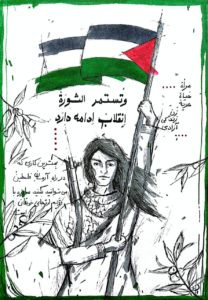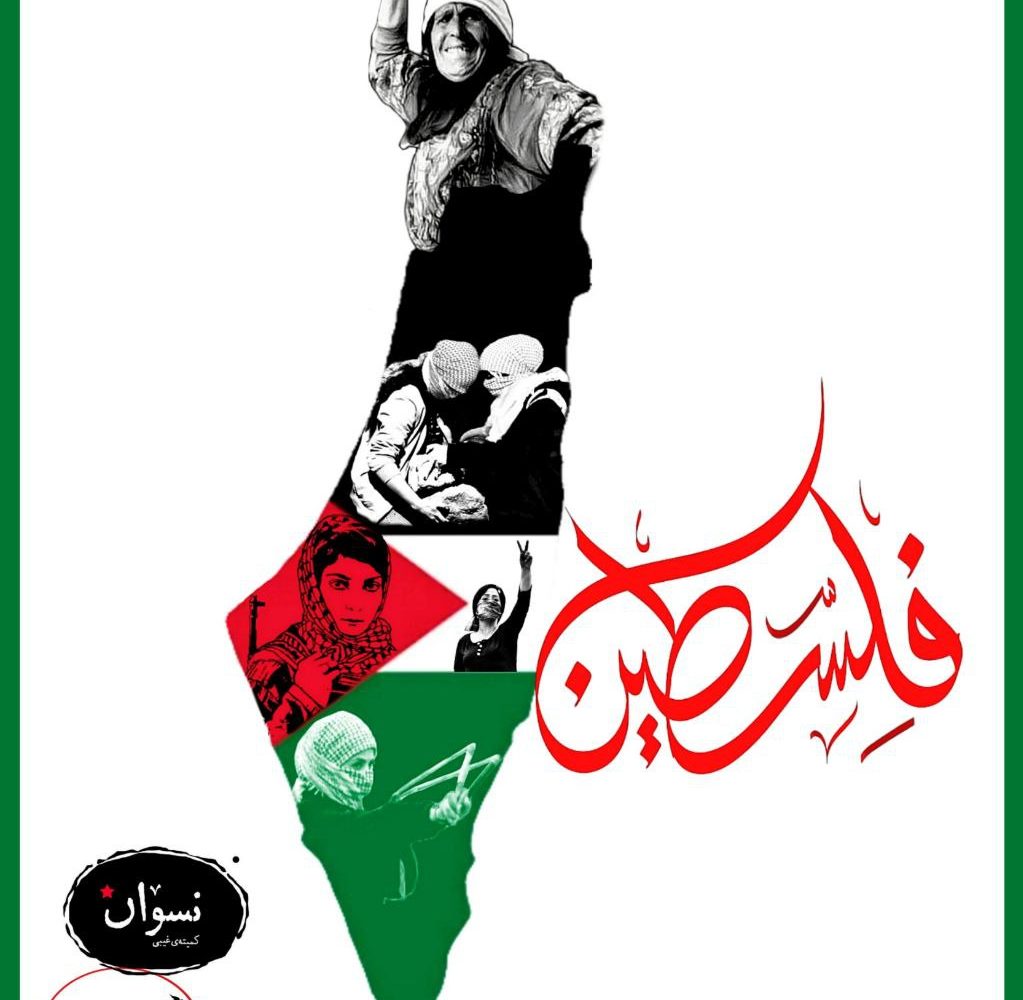The declaration of the Secret Nasvan Committee in solidarity with the struggles of the Palestinian people.
The following statement is intended to honor and commemorate Palestinian female activists. Shadia Abu-Ghazaleh, Fatima Bernawi, Leila Khaled, Ahed Tamimi, Heba Zagout, and countless other unnamed womxn courageously resist the occupation with determination, clenching their fists and holding stones in their hands.
Heba Zagout tragically lost her life some time ago due to the bombings by the Israeli army in Gaza. In one of her artworks, highlighted and referenced in the Desgoharan Collective statement, she depicted a Palestinian womxn with a caged dove atop her head. The dove has consistently served as a symbol of peace in Palestinian resistance artworks. The intertwining of land (homeland) and peace is evident in Palestinian art, literature, and daily acts of resistance. Despite the challenges of occupation and exile, the Palestinian homeland is kept vibrantly alive in their art and literature through expressive words and powerful images.
Amidst the multitude of events and diverse statements addressing the recent conflict in Palestine, the declaration from our sisters in the Desgoharan Collective holds particular significance. It resounds with a voice that has previously articulated the challenges of our times. In a landscape where ‘violence’ has become a prevalent term in mainstream media, various groups attempt to employ it to denounce Palestinians and legitimize the ongoing Israeli army-led genocide by decontextualizing actions. It is imperative for us to consistently bear in mind the nature, contexts, and perpetrators of violence, understanding how it has been and continues to be committed.
As feminists who advocate for peace while simultaneously opposing all forms of violence and oppression worldwide, we have likely grappled with a fundamental question: How can peace, struggle, and resistance coexist?
In addition to the patriarchal discourses and mainstream media, some women’s rights activists also categorize womxn as mere war victims, portraying them as individuals without subjectivity who are affected by the war-mongering of male politicians. Consequently, womxn are often labeled as ‘war victims’ alongside children. Despite the historical fact that womxn have seldom initiated wars, they have consistently fought back against the logic of dominance and violence whenever confronted by it.
It’s crucial to emphasize that the concept of peace, as advocated by feminists, is neither neutral nor devoid of context or history. In the pursuit of peace, feminists actively engage in a “fight and struggle” to establish it. Women aspire for a peace that can only be realized through resistance against all forms of violence, murder, dominance, oppression, exploitation, and colonialism. The recognition that any manifestation of injustice or inequality undermines peace underscores the understanding that in order to establish the peace women advocate for, there is no alternative but to engage in a continual struggle against inequality, oppression, and dominance.
Feminine politics, aligned with principles of peace, companionship, and openness toward the ‘other,’ possesses the capacity to self-identify with and internalize the pain of others. However, it adheres to the agenda of understanding the ‘other’ as long as this ‘other’ is the ‘oppressed other.’ Feminine politics does not entail acquiescence to dominant and exploitative ‘others.’ Women and the politics they envision aim to establish an egalitarian, pacifist, and non-belligerent world, but not at the expense of compliance and compromise with oppressors.
We underscore that the discourse commonly labeled as ‘the ultimate solution to the Palestine issue’ in mainstream media and right-wing discussions is not the focus of our conversations as women. In this critical moment, it is essential to recall the words of Ghassan Kanafani regarding the prospect of negotiations with Israeli occupiers: “Talk to whom? That’s a kind of conversation between the sword and the neck.”
The issue of occupation and the enduring circumstances in Palestine for over 70 years serve as a compass to gauge one’s position on the right side of history. In the face of decades of mass killing and genocide, discussing peace becomes implausible. Ignoring the occupation of Palestinian homes, lands, and olive groves while advocating for peace talks is untenable. Equating a brick salvaged from the ruins of a Palestinian home, along with the anger and rebellion stemming from over seven decades of occupation, with the intentions behind the occupation and genocide is an oversimplification. Condemning violence cannot be a straightforward comparison; not all forms of violence are equivalent.
To the extent that in various movements in Iran over the last few decades, particularly the “Women*, Life, Freedom” uprising, those who condemned both the violence of the police and the repression forces of the Islamic Republic, as well as the violence of the oppressed people with empty hands, found themselves aligning with the oppressor’s side. Similarly, in the Israel and Palestine narrative, anyone who negates any form of violence without considering the historical context and power dynamics of oppression stands on the side of the oppressor.
We, at the core of the Nesvan secret Committee, express our solidarity with our sisters in “Desgoharan,” and in line with their statement, we find it crucial to highlight the alarming negative trend towards the Palestinian cause that is prevalent in the current public opinion in Iran. Merely opposing the Islamic Republic in the context of Palestinian resistance is insufficient. In present-day Iran, it is imperative to stand not only against the Islamic Republic but also against the fascist and right-wing currents that undermine the cause of Palestine.
We are cognizant of this fact and firmly believe that neither the Islamic Republic nor any other oppressive patriarchal regime worldwide, despite their claims of supporting Palestine, genuinely cares about Palestine or its people. The fight against occupation and domination does not involve aligning with other oppressors; rather, it can only be realized through a sustained struggle alongside our comrades and fellow fighters in Palestine and across the globe.
We are acutely aware that our destinies are intertwined, as it is inconceivable to envision a different Middle East without the liberation of Palestine and the cessation of Israeli colonial occupation. Around half a century ago, George Habash, a prominent Palestinian leftist political leader, aptly stated: “The best thing you can do for the cause of Palestine is to fight against your reactionary regimes.”
The echo of this speech is still with us, therefore, it is clear that, despite the rhetoric of the Islamic Republic, it falls short of genuinely supporting the goal of Palestinian freedom. As a result, we do not align ourselves with the Islamic Republic on the issue of Palestine. While we acknowledge that the actions of groups like Hamas are not directly comparable to the extensive militarism and inherent violence of the occupying Israeli regime, we do not overlook the nature of these religious and reactionary groups. Additionally, we recognize the broader strategic alignment of right-wing forces and their impact on the region.
Moreover, we hold the belief that not only the Islamic Republic itself but also the alternative we propose as a replacement, along with the nature and orientation of our struggle against the oppressive Islamic Republic government to establish this alternative, directly influences the destiny of the Palestinian people. It can be asserted that the battle against the Islamic Republic and our vision for a future alternative, upon triumph, will significantly shape the fate of the Palestinian people and their ongoing struggle. We are committed to not aligning with any oppressor in order to counter another oppressor.
In conclusion, we direct our message to those who attempt to negotiate peace on paper, echoing the impassioned cries of the oppressed Arab women in the rebellion of the thirsty: “You who did not take away your dust, you who did not take away your water.”
November 2023
The Secret Nesvan Committee:
Akhgaran, Asmar, Hathour, and Hadil’s revolutionary cores.




Comment here